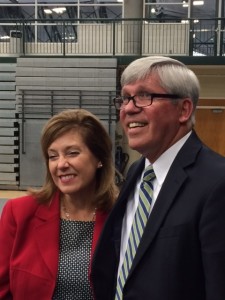The Andrew W. Mellon Foundation has awarded a $350,000 grant to Illinois Wesleyan University to develop a comprehensive, three-year program of new curricular approaches and pedagogical reform. The primary aim of the initiative, entitled Engaging Tomorrow’s Students, is to increase student engagement and enhance learning outcomes.
Provost and Dean of the Faculty Jonathan Green noted Illinois Wesleyan’s student population has significantly diversified in recent years with regard to racial and ethnic minorities, first-generation college students and students who are eligible for Pell Grants. “In addition to a greater breadth of ethnic, geographic, racial and socio-economic backgrounds, our students display a much more varied range of preparation and learning experiences from those enrolled when our current curriculum was created,” said Green. He also noted that faculty and administrators have indicated they could be better prepared to meet the intercultural needs of today’s students.
To strengthen pedagogy and increase interdisciplinary offerings, the grant will allow Illinois Wesleyan to establish four major initiatives. These include: team-taught interdisciplinary courses that experiment with varied ways of teaching; curricular and pedagogical symposia; campus teaching mentors; and workshops on the humanities and intercultural communication.
Funds from the grant will be used for guest speakers; grants for faculty members to develop specific projects within their courses; stipends for workshops, training and mentors; and the salary for a visiting assistant professor of humanities.
Associate Dean for Curricular and Faculty Development Lynda Duke will serve as project director and coordinate implementation of the grant. Green said the university’s Andrew W. Mellon Center for Curricular and Faculty Development will be the home for the work of the Engaging Tomorrow’s Students project. The Mellon Center has also been home to the work of several previous grants from the Mellon Foundation: a $300,000 grant for Re-Centering the Humanities in 2013; a $250,000 grant to support writing and information literacy in 2012; and a $175,000 grant in 2008 to develop a writing curriculum in the sophomore year.
“This is a propitious time in the University’s history as we fulfill our mission’s commitment to being a diverse community, but we do not have the resources required to retool most effectively,” said Green. “This grant makes it possible for us to adapt to a new generation of students, strengthen our teaching, and reform our curriculum to the best advantage of our students and the institution. The project will help us provide the educational support all students deserve.”







